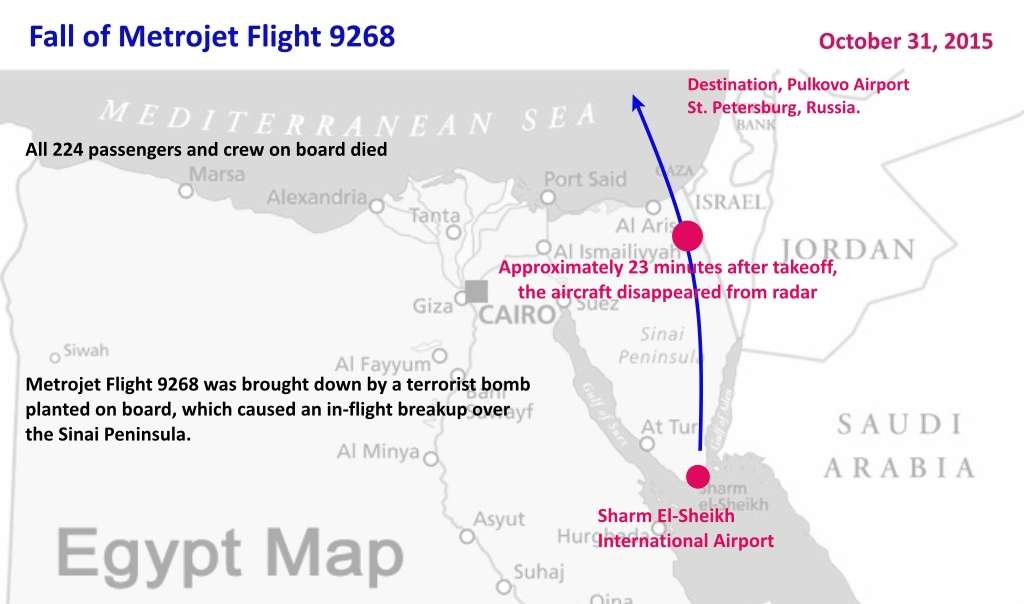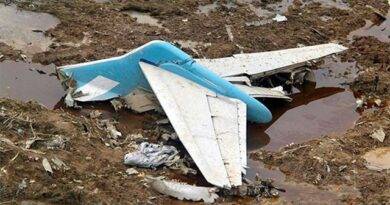The Tragic Fall of Metrojet Flight 9268: Analysis and Implications
On October 31, 2015, Metrojet Flight 9268, an Airbus A321-231, disintegrated mid-air over Egypt’s Sinai Peninsula, claiming the lives of all 224 passengers and crew aboard. This catastrophic event marked one of the deadliest aviation disasters in modern history and underscored the vulnerabilities of global aviation security. Here, we analyze the incident, its confirmed causes, and the broader implications for aviation and counter-terrorism measures.
Flight Details and Context
Metrojet Flight 9268 departed Sharm El-Sheikh International Airport, bound for St. Petersburg, Russia. Approximately 23 minutes after takeoff, the aircraft disappeared from radar screens at cruising altitude. Initial reports speculated various causes, ranging from mechanical failure to external sabotage, reflective of the volatile security environment in the Sinai Peninsula.

Confirmed Cause: A Terrorist Bombing
A thorough investigation led by the Russian Federal Security Service (FSB) and corroborated by other international agencies concluded that the crash was caused by a terrorist attack. An improvised explosive device (IED), equivalent to up to one kilogram of TNT, had been smuggled aboard and detonated, causing the aircraft to break apart in flight. This conclusion dispelled earlier theories that attributed the crash to a structural or mechanical failure.
The terrorist organization ISIS claimed responsibility for the attack, citing retaliation for Russia’s military intervention in Syria. This declaration was backed by credible intelligence, linking the attack to ISIS’s Sinai branch.
Delayed Acknowledgment by Egyptian Authorities
While Russian investigators swiftly confirmed that a terrorist bomb caused the crash of Metrojet Flight 9268, Egyptian authorities were slower to reach the same conclusion. Russia officially declared the incident an act of terrorism just weeks after the disaster. In contrast, Egypt did not publicly acknowledge terrorism as the cause until February 2016—almost four months later. This delay, widely seen as an effort to protect the nation’s tourism sector, drew criticism for lack of transparency. The timeline has since been confirmed by multiple credible sources and remains consistent with the most recent official records.
Key Investigative Findings
- Explosion Evidence: Forensic analysis identified explosive residue on wreckage parts, ruling out spontaneous structural failure.
- Security Lapses: The explosive device was likely concealed within passenger luggage, revealing significant lapses in airport security screening processes.
- Immediate Grounding: In response, Russia suspended all flights to and from Egypt, a move echoed by other nations concerned about aviation security.

source: nypost.com/2015/11/05/
Global Security Implications
The bombing of Metrojet Flight 9268 amplified global concerns about the security of civil aviation, particularly in politically unstable regions. Key takeaways include:
- Strengthened Airport Security: Airports worldwide revisited their security protocols, including baggage screening, employee background checks, and perimeter controls.
- Counter-Terrorism Collaboration: Intelligence-sharing among nations intensified to preempt such attacks.
- Economic Impact on Egypt: The crash severely impacted Egypt’s tourism sector, with a significant decline in foreign arrivals, particularly from Russia.
Lessons for Aviation Safety
The tragedy of Metrojet Flight 9268 highlights the evolving nature of threats to aviation. While technological advancements have enhanced aircraft safety, human vulnerabilities—such as insider threats and security loopholes—remain critical. This incident serves as a reminder that aviation security requires continuous adaptation and global cooperation.
Recommended Article: Pan Am Flight 103: The Lockerbie Bombing
References and Further Reading:
https://en.wikipedia.org/wiki/Metrojet_Flight_9268
https://www.pbs.org/newshour/tag/metrojet-flight-9268
https://www.newarab.com/tag/metrojet-flight-9268
image source:
https://nypost.com/2015/11/05/russia-egypt-denies-claims-bomb-brought-down-jet/
Featured image source:
By Mehmet Mustafa Celik – https://www.airliners.net/photo/Metrojet-Kolavia/Airbus-A321-231/2665121/L, CC BY-SA 4.0, https://commons.wikimedia.org/w/index.php?curid=116424171


